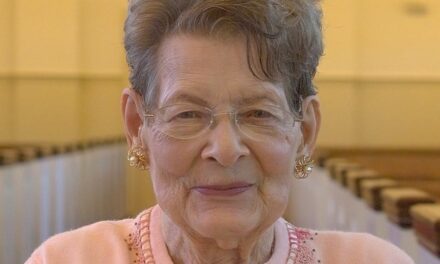Susanne Mentzer could not stop a torrential downpour on the evening of November 12, but for opera lovers and supporters who braved the weather getting to Fletcher Opera Theater, she certainly did brighten the dreary, rainy evening. Her recital featured art songs, folk songs, arias and music by Cole Porter. Her stage presence was spiced by skillful subtle acting as she ranged from a cheerleading maiden, urging her sweetheart to the finish line in a Venetian gondola race, to a coquettish tease – which she does very well, whether in a “trouser” role such as Cherubino or as The Diva of the Empire, as conceived by Eric Satie. She did all this despite Opera Company of North Carolina Artistic Director Robert Galbraith’s request that the audience welcome her with finger snapping rather than applause because she was suffering with a migraine. The finger snapping didn’t work very well, and Mentzer assured the audience that she was quite comfortable with applause, much to the relief of all.
A native of Philadelphia, Mentzer spent the last two years of high school in Santa Fe, New Mexico, where she was exposed to opera while working as an usher at the Santa Fe Opera. From there she went to the University of the Pacific in Stockton, California, to study music therapy. She was most interested in choral music at the time, but through the encouragement of those who saw her potential and some fortuitous opportunities, she found opera and began her remarkable career. Today, in her prime, she is one of the world’s most sought-after mezzo-sopranos. Debuting at the Met in 1988, she has returned frequently, earning accolades in roles such as Cherubino, The Composer, Rosina, Octavian, and more. She has appeared in other prestigious opera houses and concert halls and at music festivals all around the world.
Her program opened with Rossini’s 1857 song cycle La regata veneziana, a charming set of three songs depicting the feelings of a young woman watching her sweetheart compete in a regatta. He spies her cheering him on from the sidelines and reaches to the finish line to win the race with a flourish, after which she offers him a kiss. Mentzer was totally at home with the music, and her subtle facial and body language added charm to the total performance. The second set of five songs was typical Eric Satie: playful, a bit cryptic and artfully intricate. The first half of the recital concluded with what most of the audience seemed to be waiting for — two Cherubino arias from Le nozze di figaro. Both confirmed why this is a role for which Mentzer has received considerable accolades. As she sang “Voi, che sapete,” I thought, “If there is a more perfect, more heavenly melody anywhere, I do not know it.” What pleasure her superb rendition of this masterpiece provided!
Whether singing in Italian, French, or English, the soloist’s diction was excellent, as she continued to make clear after intermission, when the audience was treated to four American folk songs. Two of them, arranged by John Jacob Niles, were especially treasured by this reviewer. “Go ‘way from my window” and “Wayfaring Stranger” trigger recollections of what seems in retrospect to have been an idyllic time, years ago. This is one of the personal and special values of music, and especially folk songs, which can trigger memories and feelings and enrich one’s life, not by adding more but by enriching what is there but may have been forgotten or pushed aside by the stresses of simply making it, day by day.
The closing set of Cole Porter songs provided a different set of delights for the audience. Porter, experiencing something of a resurgence following the recent movie De-Lovely, was a master of uniquely turned phrases, both lyrically and musically. Mentzer enjoyed herself especially in the roles of “The Physician” and “The Queen of Terre Haute,” two of Porter’s satiric/comic songs.
Praise is certainly due DeWitt Tipton of Charlotte, who provided outstanding accompaniment while filling in for Mentzer’s usual accompanist, Craig Rutenberg. Tipton was on cue and cleverly supportive, and he put on a good show by vocalizing a verse of one of the Porter songs.
For encores, the recitalist chose Rossini’s showpiece from Il barbiere di Siviglia, “Una vocce poco fa,” which she sang gloriously, and the oft-heard beautiful folk song “He’s gone away,” which, on the day after Veterans Day, she dedicated to Americans in uniform. It was a rare and wistful touch in a mostly bright, cheerful, and brilliant program. I don’t know much about migraines, but if hers had not abated by this time, she deserves a medal of honor for service above and beyond the call of duty. We look forward to hearing her lustrous voice in feature endeavors. And we look forward to the Opera Company of North Carolina’s productions of The Merry Widow in April and Tosca in June.











